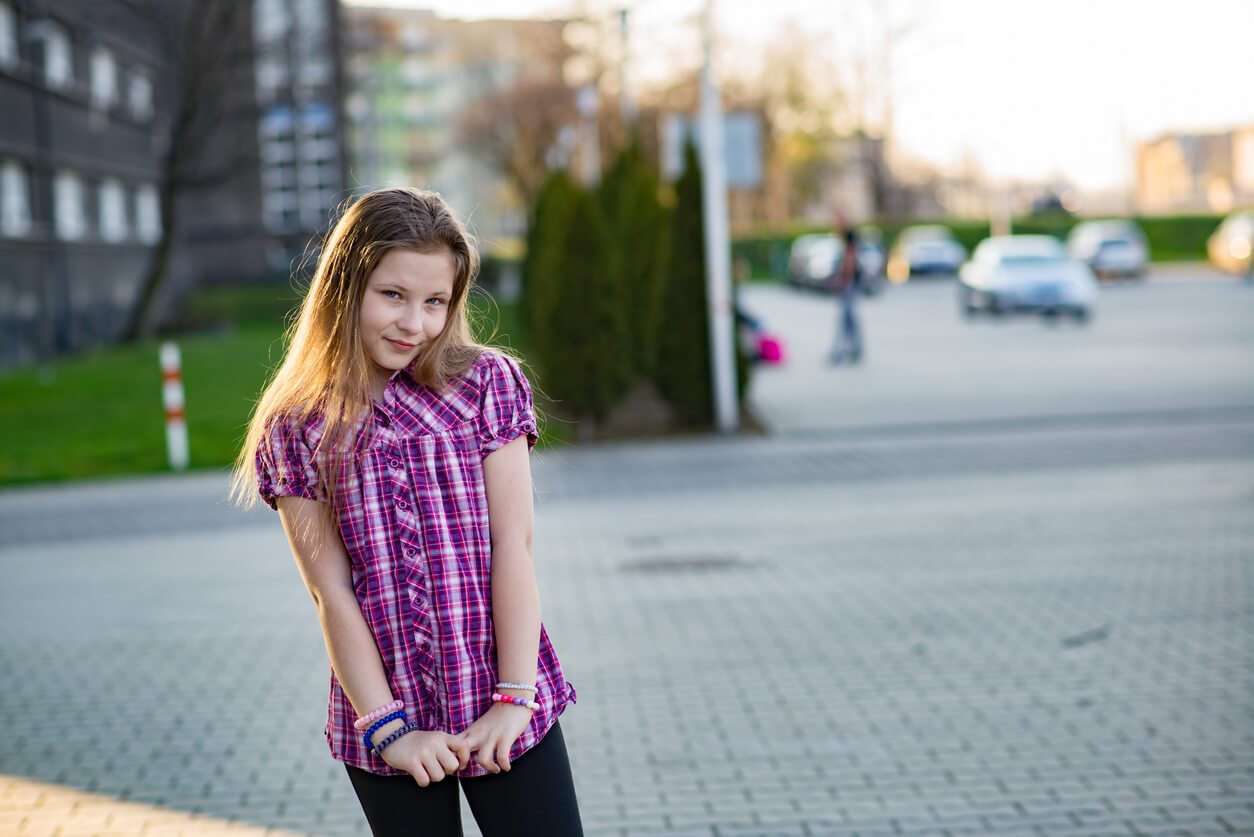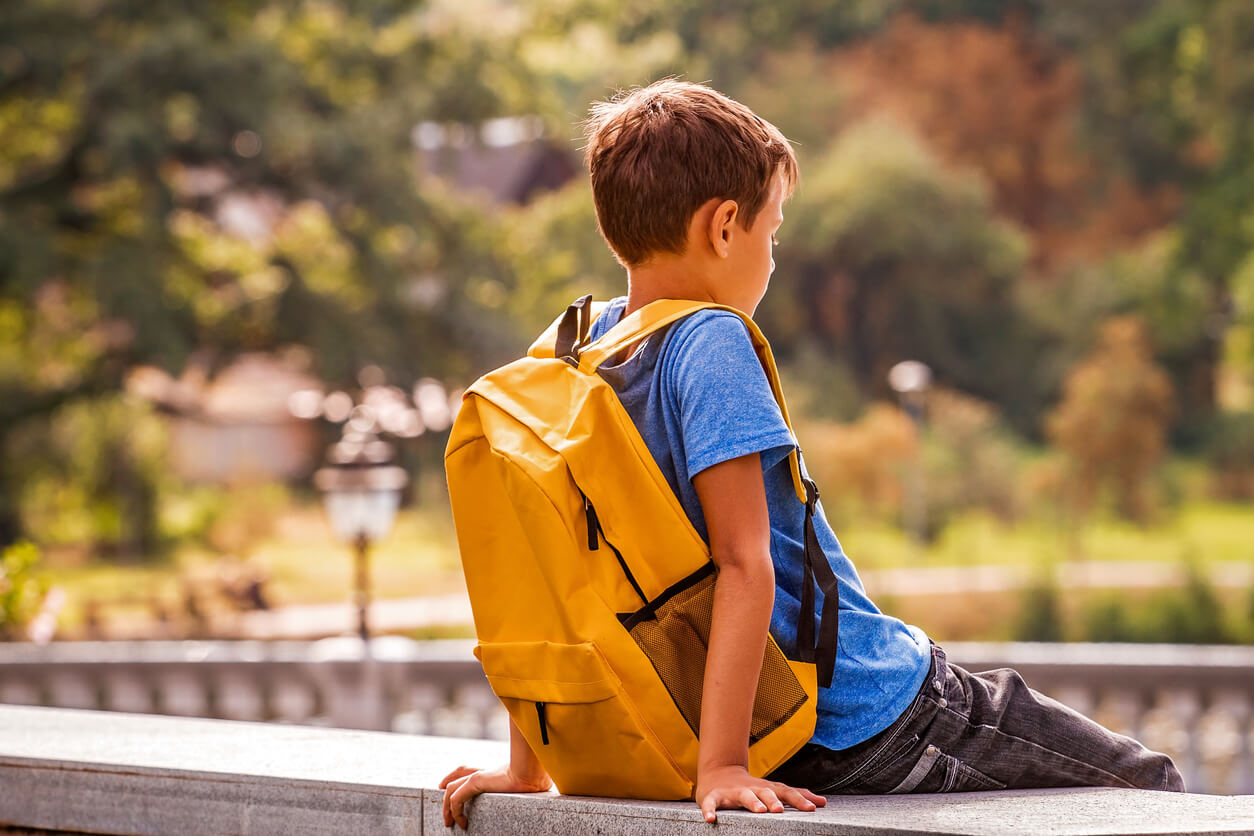The Characteristics of Introverted Children


Written and verified by the psychologist Sharon Capeluto
One thing’s for sure: Introverted children are no happier or less happy than extroverted ones. Mistakenly, the former are thought to be sad, shy, sullen, or bored. In fact, many people consider introversion as a problem to be solved and extroversion as a valuable aspect to be conquered. To dispel these myths, we want to take a closer look at the characteristics of introverted children.
Although this personality trait may represent some obstacle on a personal or social level, on its own, it doesn’t imply any disadvantage. The truth is that each of these groups has its own strengths and weaknesses. Both introverted and extroverted children face different challenges in the way they relate to themselves and to other people.
These are the main characteristics of introverted children
In the following paragraphs, we’ll focus specifically on the characteristics of introverted children, their most common manifestations, and their preferences and difficulties.
1. They have a rich inner life
Introversion is precisely a personality trait that’s characterized by tending to internal rather than external processes. This means that these people tend to focus on internal feelings and states of mind. Therefore, they tend to have a high level of introspection. That is, they’re able to look inward, so they know themselves in depth.

2. They don’t enjoy being in high-stimulus spaces for long periods of time
Introverted children have a limit when it comes to staying in a place with a lot of stimuli. Too much noise, too many people, too many images, or too many activities become annoying to them after a while.
Does this mean that they don’t enjoy birthday parties or mass events? Although it wouldn’t be surprising for them to shy away from crowds, the answer isn’t so decisive. A little one who tends toward introversion may have a great time at a large celebration, although they would prefer a less noisy, more minimalist environment.
The point here is that they don’t like to spend a long time among a lot of people or noise. Therefore, after spending a few hours at a birthday party, they may look for a quieter place where they can recover their energy.
3. They need personal space
Alone time is golden for this group of people. Silence and personal space are a source of well-being and calm for them. Although they like to be with friends, they also enjoy being in their own company.
An important clarification: Introverted kids aren’t necessarily shy kids. This distinction is essential to understand that introversion isn’t evidence of fear of social situations, nor does it limit interaction with the outside world due to insecurities. Simply put, these children need to have a personal space to turn to when they feel tired.
4. They’re great observers
Not everyone is capable of observing their environment with attention. Children who focus their energy on the inner world tend to analyze situations from a deep and detailed perspective. Therefore, it’s not unusual for them to observe nature for a long time, listen attentively to conversations in which they’re not actively participating, or admire a landscape for a long time.

5. They’re selective with their attachments
We’ve already said that introverted children aren’t necessarily shy, although they can be. Although they do have a social life, they’re more selective when it comes to choosing their friends. That is, they prefer few but intimate friends, rather than many and superficial ones. They don’t allow just anyone into their lives. Rather, they approach people they truly trust and build close bonds with them.
Children aren’t 100% introverted
The terms introversion and extroversion were defined and developed by the Swiss psychiatrist, Carl Jung, who clarified that no person is 100% introverted or extroverted, but tends toward one of these two poles. In addition, he used the concept of “ambivert” to name those who are in the middle point between these extremes.
Depending on each child, this temperament may be more or less intense and may or may not lead to some difficulties. In this regard, it’s important to evaluate the particular case and find a way for the child to feel more comfortable in a world characterized by vortex and volatility, which seems to be designed for extroverted people.
One thing’s for sure: Introverted children are no happier or less happy than extroverted ones. Mistakenly, the former are thought to be sad, shy, sullen, or bored. In fact, many people consider introversion as a problem to be solved and extroversion as a valuable aspect to be conquered. To dispel these myths, we want to take a closer look at the characteristics of introverted children.
Although this personality trait may represent some obstacle on a personal or social level, on its own, it doesn’t imply any disadvantage. The truth is that each of these groups has its own strengths and weaknesses. Both introverted and extroverted children face different challenges in the way they relate to themselves and to other people.
These are the main characteristics of introverted children
In the following paragraphs, we’ll focus specifically on the characteristics of introverted children, their most common manifestations, and their preferences and difficulties.
1. They have a rich inner life
Introversion is precisely a personality trait that’s characterized by tending to internal rather than external processes. This means that these people tend to focus on internal feelings and states of mind. Therefore, they tend to have a high level of introspection. That is, they’re able to look inward, so they know themselves in depth.

2. They don’t enjoy being in high-stimulus spaces for long periods of time
Introverted children have a limit when it comes to staying in a place with a lot of stimuli. Too much noise, too many people, too many images, or too many activities become annoying to them after a while.
Does this mean that they don’t enjoy birthday parties or mass events? Although it wouldn’t be surprising for them to shy away from crowds, the answer isn’t so decisive. A little one who tends toward introversion may have a great time at a large celebration, although they would prefer a less noisy, more minimalist environment.
The point here is that they don’t like to spend a long time among a lot of people or noise. Therefore, after spending a few hours at a birthday party, they may look for a quieter place where they can recover their energy.
3. They need personal space
Alone time is golden for this group of people. Silence and personal space are a source of well-being and calm for them. Although they like to be with friends, they also enjoy being in their own company.
An important clarification: Introverted kids aren’t necessarily shy kids. This distinction is essential to understand that introversion isn’t evidence of fear of social situations, nor does it limit interaction with the outside world due to insecurities. Simply put, these children need to have a personal space to turn to when they feel tired.
4. They’re great observers
Not everyone is capable of observing their environment with attention. Children who focus their energy on the inner world tend to analyze situations from a deep and detailed perspective. Therefore, it’s not unusual for them to observe nature for a long time, listen attentively to conversations in which they’re not actively participating, or admire a landscape for a long time.

5. They’re selective with their attachments
We’ve already said that introverted children aren’t necessarily shy, although they can be. Although they do have a social life, they’re more selective when it comes to choosing their friends. That is, they prefer few but intimate friends, rather than many and superficial ones. They don’t allow just anyone into their lives. Rather, they approach people they truly trust and build close bonds with them.
Children aren’t 100% introverted
The terms introversion and extroversion were defined and developed by the Swiss psychiatrist, Carl Jung, who clarified that no person is 100% introverted or extroverted, but tends toward one of these two poles. In addition, he used the concept of “ambivert” to name those who are in the middle point between these extremes.
Depending on each child, this temperament may be more or less intense and may or may not lead to some difficulties. In this regard, it’s important to evaluate the particular case and find a way for the child to feel more comfortable in a world characterized by vortex and volatility, which seems to be designed for extroverted people.
All cited sources were thoroughly reviewed by our team to ensure their quality, reliability, currency, and validity. The bibliography of this article was considered reliable and of academic or scientific accuracy.
- Acosta Medina, J, L. Niños introvertidos: ¡comprenderlos para educarlos bien! Temas de Psicología Educativa. 46-52.
- Carrigan, P. M. (1960). Extraversión-introversión como dimensión de la personalidad: Una reevaluación. Boletín psicológico, 57(5), 329.
- Fonseca, C. (2019). Niños y niñas introvertidos: cómo vivir felices en un mundo extrovertido. Editorial Sirio SA.
This text is provided for informational purposes only and does not replace consultation with a professional. If in doubt, consult your specialist.








